It looks like you're using an Ad Blocker.
Please white-list or disable AboveTopSecret.com in your ad-blocking tool.
Thank you.
Some features of ATS will be disabled while you continue to use an ad-blocker.
share:
Via simple yet innovativish methodology-driven habits that strive for increasingly logical efficiencies, I've managed to get my home towards zero
trash output status.
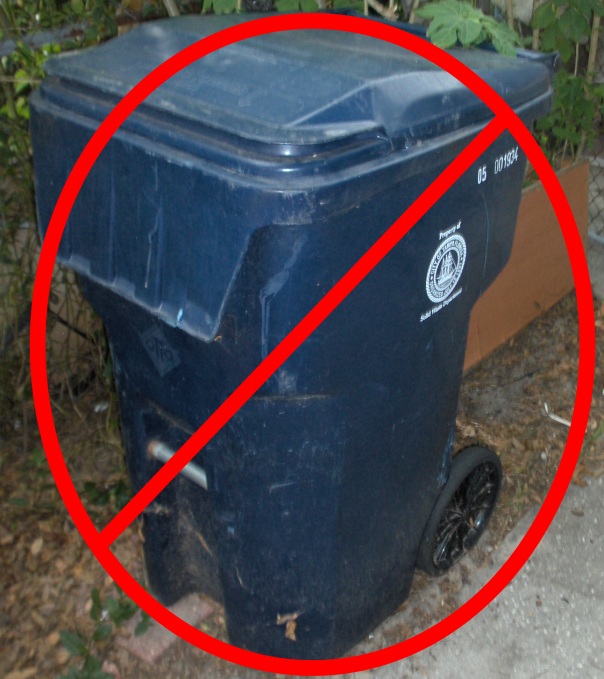
My methods are really quite simple: frugality, compost, reuse / repurpose, recycle, catch water and BURN!
The surprise here may be that this system of habits wasn't motivated by 'emotional environmentalism' at all.
I like to think of my entire premises as a giant living transducer complex.
The way I do things aren't any harder, nor require much more work, as far as I'm concerned. It's all about habits and methodologies. This means for most its about breaking habits, and one I think much about is the too common habit of being non or even anti-methodical. I've yet to find a proper word to describe this, but I observe it a lot. Perhaps a better approach here is 'practice makes perfect': perfected habits that is.
FRUGALITY:
Step 1: Stop Buying Trash Bags.
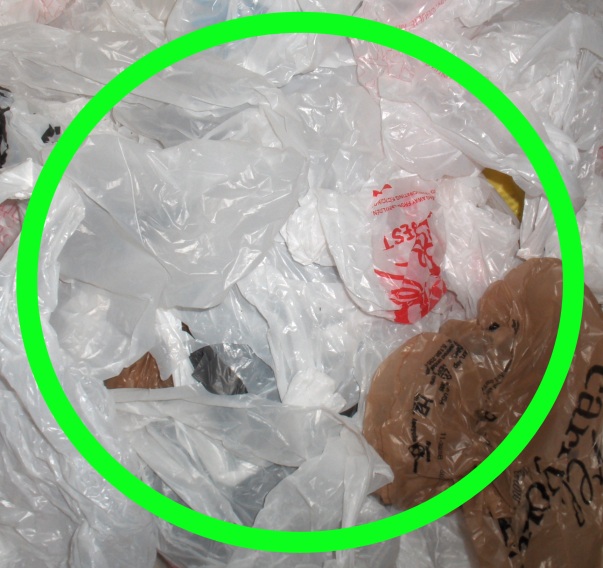
At every possible moment this is occuring: Person drives to store. Amongst things, trash bags are bought. Trash bags are loaded into grocery bags and driven home. Grocery bags are then stuffed into trash bags and then each are thrown out together. Shouldn't that seem like an odd, inefficient habit?
I just skip all those steps, while not buying bags I don't need (although there is a varient I'll get into below). Instead of have big trash can + bag full of trash (that often includes grocery bags), I use the grocery bag as the trash bag.
I already have the grocery bags. In fact in being as frugal as one can be concerning accepting grocery bags, I still cant go through them fast enough:
1. For several years now I always insist baggers give me the minimal amounts of bags. I have them over stuff them. Even when I walk to a store which is often. Never have them double bag. Not one single times has a bag broken and ruined my stuff.
2. I use them for shipping, and I ship a lot with them.
3. They are the trash bags, and I find other utility type purposes as throw away resources when conducting various projects and experiments.
My (disposable) "trash can":
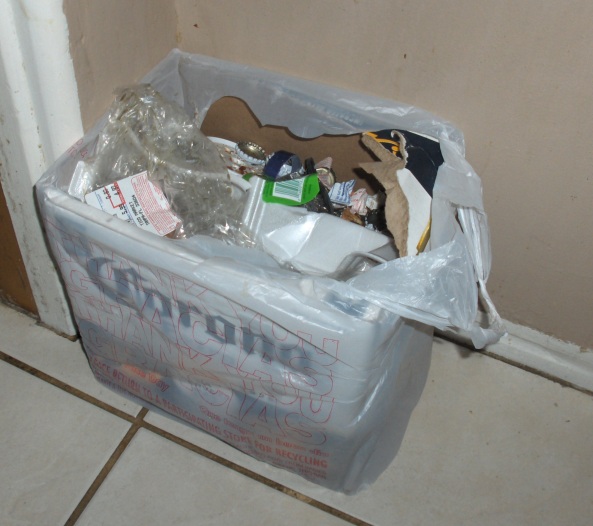
Now this ruggedish methodology might seem less civilized to some, but I argue having a trash vessel several times larger holding trash inside the house for longer periods of time is much less sanity and there less civilized. A smaller vessel means non-transducable waste stays inside longer.
I use to hang the bag off a cabinet knob, but since I drink a couple cases of Corona a week I eventually started using the box as the trash can. My improved method wraps a bag or two (depending on holey bags or not) with the grocery bag (perfect fit) which then provides decent leakage protection coupled with stiff and rugged package characteristics.
Step 2: Rethink The Norm.
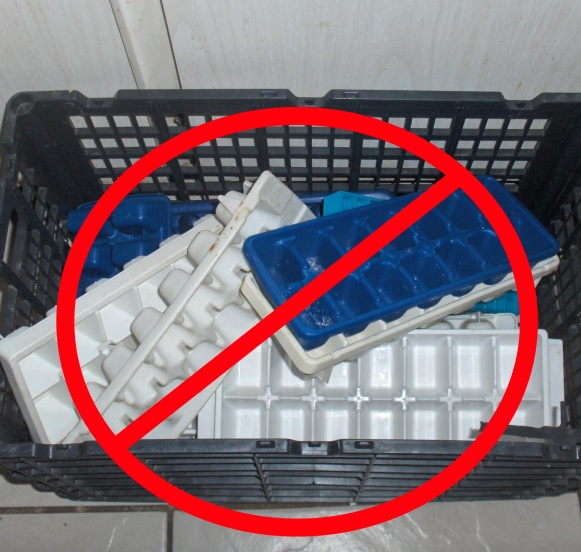
Minimizing output also requires minimizing input, especially where frugality is a directive. One example would be buying things you dont need. For instance, I use food 'tupperwares' as my ice bins. My initial goal wasn't to not need icebins, it was to improve on the practice. I have at least 10 ice trays, but don't like them as they take longer to frezze due to the insulative cells, and they're a pain to clean. Thin layers of water inside open bottom vessels enables far more efficient ice solidification, are simple to clean, and can rapidly be deployed. Breaking the ice is simple: either drop the ice flats onto one another and they shatter, or break them with the backside of a dense knife (which I keep on teh counter at all times anyways). Faster the freeze, faster to prepare, faster to clean, less stuff around, less investments, more uses per investment, and less eventual trash.
These are my 'green' food life extender 'tupperwares':
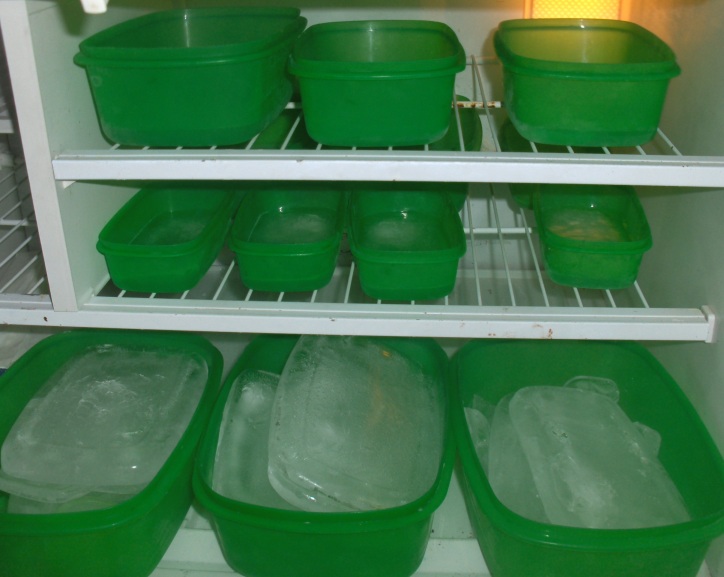
Note the lack of TV dinners. TV dinners are not only generally garbage in food packaging, the packaging itself is typically not recycle worthy when all is done and therefore ensures garbage output.
Step 3: Thrift.
Thrift stores aren't just a good place to get all sorts of odd and random yet useful items, they're also a place to offload perfectly good things you have no use for. The non-profit locations even give you a donation sllip that's a tax write-off. So when you phase out your now unneeded ice trays you can take to thrift store and get tax credits.
COMPOST:
The biggest thing that seperates garbage from recycle worthy resources are 'slime' (i.e. food yuck). Luckily much food can be composted, but certainly not all in the common sense of the word. Implementing a sink water catchment routine helps hammer this down. What cannot be fed to plants are oils and salts. Oils in soil eventually buildup to form a hardened layer around the sand type grains leading to soil that repels water. Salts destroy the ability for most plants to grow in them. Meats & cheeses in general have no place in compost / soil, but that doesn't always mean they must be thrown out. In many cases they can be burned and produce a different type of fertilizer in the process.
Lately my old garbage can used used in the micro-nursery to catch rainwater and pour into my 4'x30' compost bin / worm factory when it doesn't rain all week:
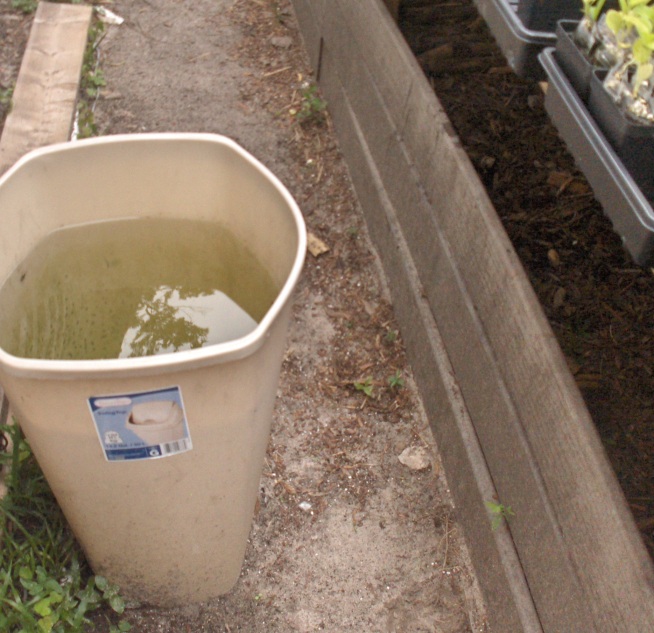
REUSE / REPURPOSE:
Step 1: Use Trash To Take Out The Trash.
Following suit with the grocery bags, other bags serve just as well (i.e. breadbags, chips). Thin cardboard stock from food packaging I break down for shippping materials, and use the inner bags for trash (i.e. cereal boxes).
So here the process of saving money on shipping supplies also minimizes my trash output:
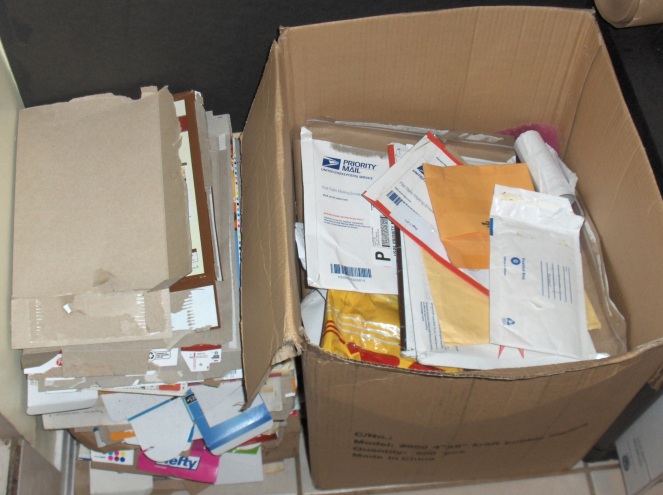
Step 2: Reconsider What Trash Is.
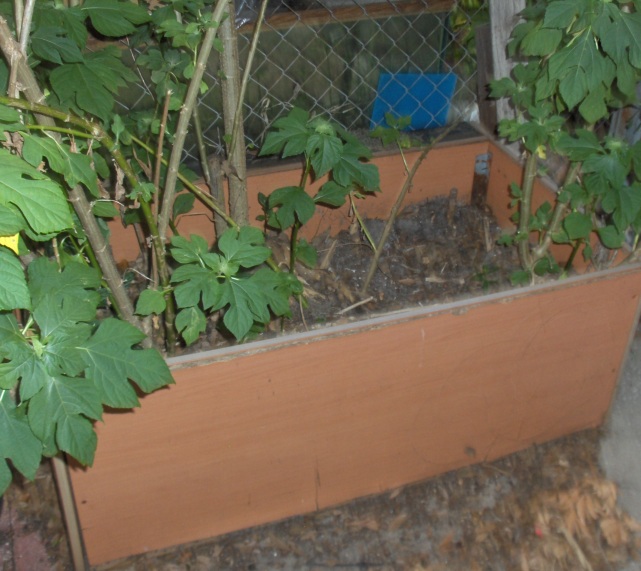
Example #1: This old downtrodden cabinet item turned plant container. I get cutting from the plants in this one, and it furthers my jungle effort. Eventually the wood particles will begin to separate from the outer laminate layers and the wood products will then make for good compost. This leaves only the laminate remnants to be thrown out. In the meantime I make actual money with this 'garbage', to later fertilize other plants with.
Example #2: Take broken things apart. Not only will you better develop your understandings of how things work, you can harvest cool parts for making things like animatronics, but when complex machines are broken down to their raw components the recycle conveyors can now utilize them as recyclable. If you have children I strongly urge parents to adopt this practice with them. I know that doing this on my own from childhood has been the basis of all of my income acquiring skills, that have generally had me either as an independent contractor or working for myself completely.

My methods are really quite simple: frugality, compost, reuse / repurpose, recycle, catch water and BURN!
The surprise here may be that this system of habits wasn't motivated by 'emotional environmentalism' at all.
I like to think of my entire premises as a giant living transducer complex.
trans·duc·er
Noun:
A device that converts one type of energy or signal into another.
Synonyms: converter
The way I do things aren't any harder, nor require much more work, as far as I'm concerned. It's all about habits and methodologies. This means for most its about breaking habits, and one I think much about is the too common habit of being non or even anti-methodical. I've yet to find a proper word to describe this, but I observe it a lot. Perhaps a better approach here is 'practice makes perfect': perfected habits that is.
FRUGALITY:
Step 1: Stop Buying Trash Bags.

At every possible moment this is occuring: Person drives to store. Amongst things, trash bags are bought. Trash bags are loaded into grocery bags and driven home. Grocery bags are then stuffed into trash bags and then each are thrown out together. Shouldn't that seem like an odd, inefficient habit?
I just skip all those steps, while not buying bags I don't need (although there is a varient I'll get into below). Instead of have big trash can + bag full of trash (that often includes grocery bags), I use the grocery bag as the trash bag.
I already have the grocery bags. In fact in being as frugal as one can be concerning accepting grocery bags, I still cant go through them fast enough:
1. For several years now I always insist baggers give me the minimal amounts of bags. I have them over stuff them. Even when I walk to a store which is often. Never have them double bag. Not one single times has a bag broken and ruined my stuff.
2. I use them for shipping, and I ship a lot with them.
3. They are the trash bags, and I find other utility type purposes as throw away resources when conducting various projects and experiments.
My (disposable) "trash can":

Now this ruggedish methodology might seem less civilized to some, but I argue having a trash vessel several times larger holding trash inside the house for longer periods of time is much less sanity and there less civilized. A smaller vessel means non-transducable waste stays inside longer.
I use to hang the bag off a cabinet knob, but since I drink a couple cases of Corona a week I eventually started using the box as the trash can. My improved method wraps a bag or two (depending on holey bags or not) with the grocery bag (perfect fit) which then provides decent leakage protection coupled with stiff and rugged package characteristics.
Step 2: Rethink The Norm.

Minimizing output also requires minimizing input, especially where frugality is a directive. One example would be buying things you dont need. For instance, I use food 'tupperwares' as my ice bins. My initial goal wasn't to not need icebins, it was to improve on the practice. I have at least 10 ice trays, but don't like them as they take longer to frezze due to the insulative cells, and they're a pain to clean. Thin layers of water inside open bottom vessels enables far more efficient ice solidification, are simple to clean, and can rapidly be deployed. Breaking the ice is simple: either drop the ice flats onto one another and they shatter, or break them with the backside of a dense knife (which I keep on teh counter at all times anyways). Faster the freeze, faster to prepare, faster to clean, less stuff around, less investments, more uses per investment, and less eventual trash.
These are my 'green' food life extender 'tupperwares':

Note the lack of TV dinners. TV dinners are not only generally garbage in food packaging, the packaging itself is typically not recycle worthy when all is done and therefore ensures garbage output.
Step 3: Thrift.
Thrift stores aren't just a good place to get all sorts of odd and random yet useful items, they're also a place to offload perfectly good things you have no use for. The non-profit locations even give you a donation sllip that's a tax write-off. So when you phase out your now unneeded ice trays you can take to thrift store and get tax credits.
COMPOST:
The biggest thing that seperates garbage from recycle worthy resources are 'slime' (i.e. food yuck). Luckily much food can be composted, but certainly not all in the common sense of the word. Implementing a sink water catchment routine helps hammer this down. What cannot be fed to plants are oils and salts. Oils in soil eventually buildup to form a hardened layer around the sand type grains leading to soil that repels water. Salts destroy the ability for most plants to grow in them. Meats & cheeses in general have no place in compost / soil, but that doesn't always mean they must be thrown out. In many cases they can be burned and produce a different type of fertilizer in the process.
Lately my old garbage can used used in the micro-nursery to catch rainwater and pour into my 4'x30' compost bin / worm factory when it doesn't rain all week:

REUSE / REPURPOSE:
Step 1: Use Trash To Take Out The Trash.
Following suit with the grocery bags, other bags serve just as well (i.e. breadbags, chips). Thin cardboard stock from food packaging I break down for shippping materials, and use the inner bags for trash (i.e. cereal boxes).
So here the process of saving money on shipping supplies also minimizes my trash output:

Step 2: Reconsider What Trash Is.

Example #1: This old downtrodden cabinet item turned plant container. I get cutting from the plants in this one, and it furthers my jungle effort. Eventually the wood particles will begin to separate from the outer laminate layers and the wood products will then make for good compost. This leaves only the laminate remnants to be thrown out. In the meantime I make actual money with this 'garbage', to later fertilize other plants with.
Example #2: Take broken things apart. Not only will you better develop your understandings of how things work, you can harvest cool parts for making things like animatronics, but when complex machines are broken down to their raw components the recycle conveyors can now utilize them as recyclable. If you have children I strongly urge parents to adopt this practice with them. I know that doing this on my own from childhood has been the basis of all of my income acquiring skills, that have generally had me either as an independent contractor or working for myself completely.
edit on
21-4-2013 by IgnoranceIsntBlisss because: (no reason given)
Between uber durable stainless steel mixer 'glasses', and these garlic jars, I no longer buy new drinking glasses.:
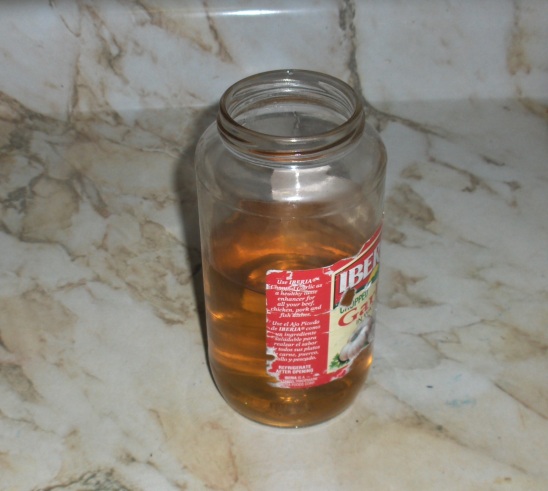
I prefer these jars as they're mostly spill proof, and I have the lids to store away my daily unfinished proprietary nootopic / anti-cancer formula tea in the fridge.
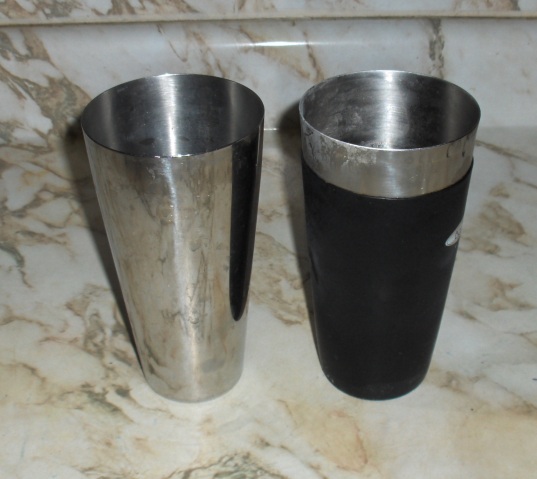
I save a lot of other jars and things for various purposes:
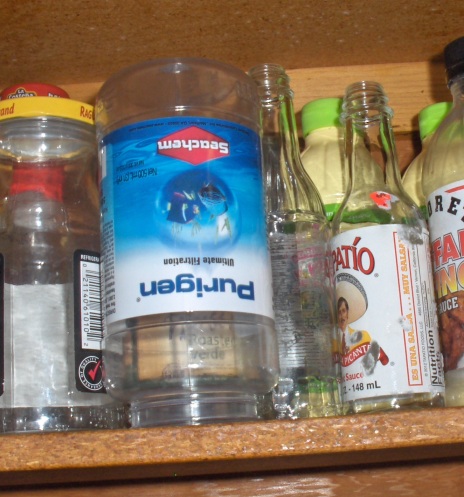
I especially fancy spice & medicine bottles as I grow and make my own spice blends & medicines, as well as conduct all sorts of chemistry each week:
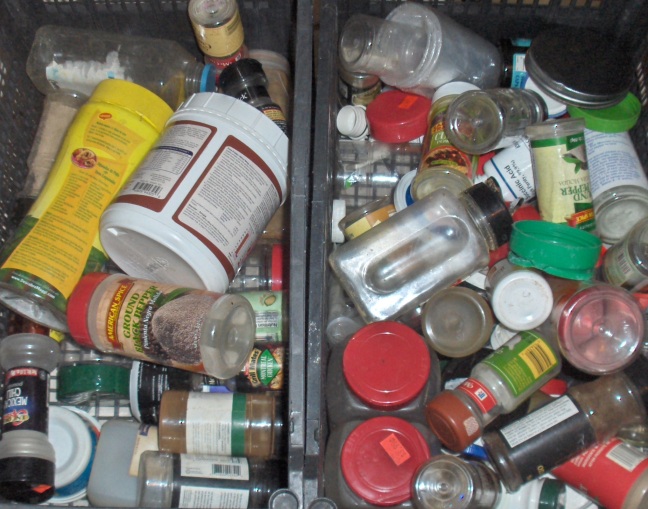
Another by-product of living are these lids:
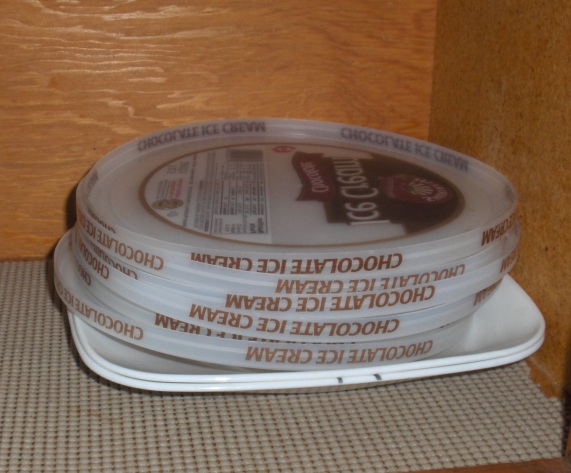
While they're on standby to cover a bucket with whatever, they rest where I keep my plates. They're lightweight and efficient to work with like paper (or worse foam) plates, but are reusable.
CATCH WATER:
I harness at least 10 gallons per day for my plants doing this:
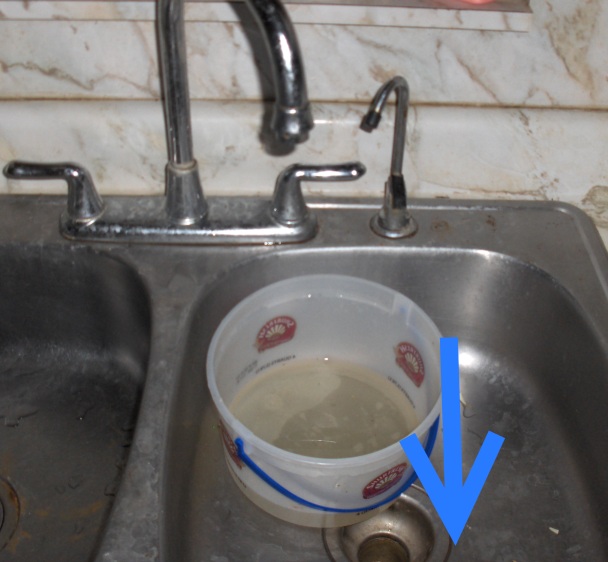
Kitchen window (screen removed) is immediately behind the sink:
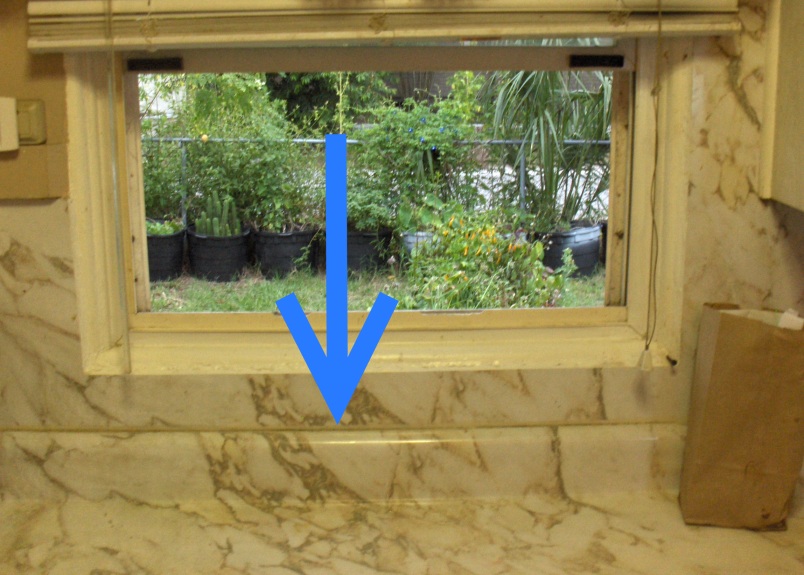
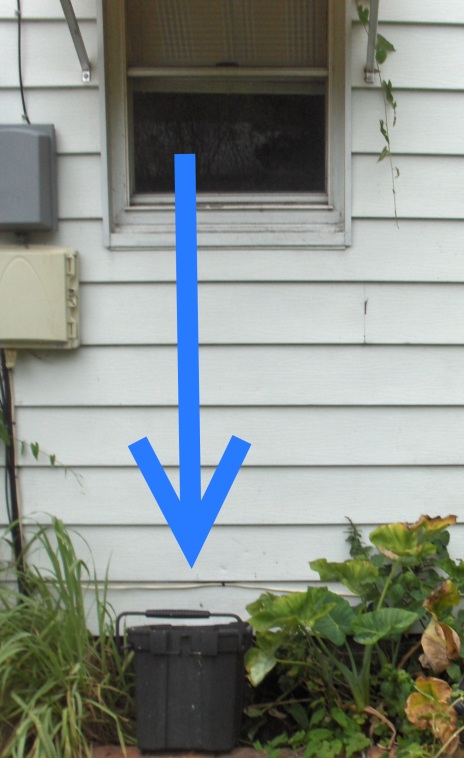
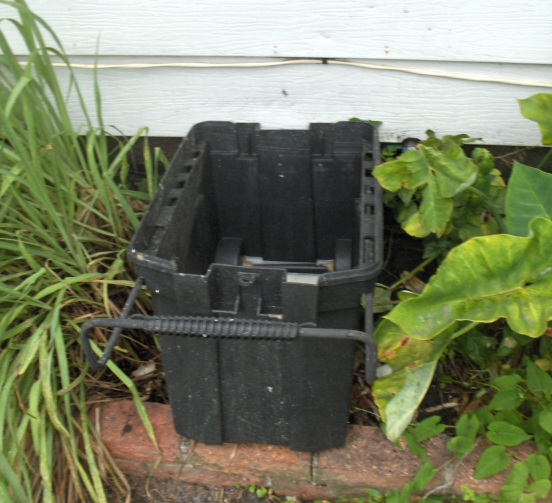
This ties more into the similar water savings method guide I will make eventually, but it demonstrates many of the other concepts herein. I use these one gallon ice cream bucket to catch water in the sink (amongst many other daily uses). It's also become my more common compost material disposal method. Pour this out the window into water catch vessel on wheels. This vessel rests in my 'semi-aquatic zone' where the constant splash out keeps the micro-climate moist and humid. When the bin gets yucky, or its about to rain, I haul the bin over to pour into ground planted areas.
General rules to catching sink water:
-NO oils or salty rinsing into the bin.
-Dairy rinse, like milk dishes, is good and helps balance the pH of the collective outflow.
-After the first rinse of soapy dishes the water should be perfectly good to catch.
Of course having a window immediately adjacent to the sink, with screen removed, should be pretty important to maintain such a routine. For a few years I've thought about gate valves with special sink drains for such a solution, but being a renter not a chance of such project. For a while I was using the buckets on the counter for compost, but then realized I can use the bucket to solve the sink water issue. Now a lot of compost material goes out in the bucket of water, or I simply chuck the stuff out there amongst all the potted plants in the yard.
BURN!:
Big city livin':
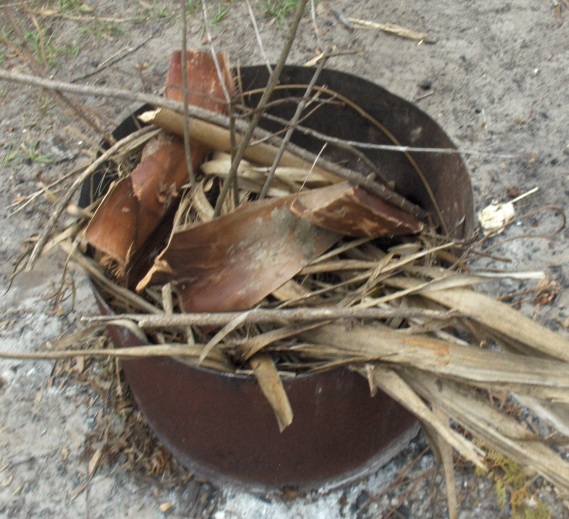
This step is crucial in minimizing trash out out to the fullest. Until I started burning regularly just recently, the concept of zero trash output had never even been a goal or item of much thought. Now that I burn, right in the heart of the city where its very uncommon, feeding the fuel flow is part of the goals. Now meats, oils & grease, breading etc are all burned. Generally they make the fire smell just for a spell. I had a can of olive oil go rancid on me last year so stuck under the sink. Recently I've been using it for starting fuel on occasion when improper kindling ratios are a problem. Soon the oil will be all poured out, and then I'll be able to put the can in the recycle bins.
Fuel brick:
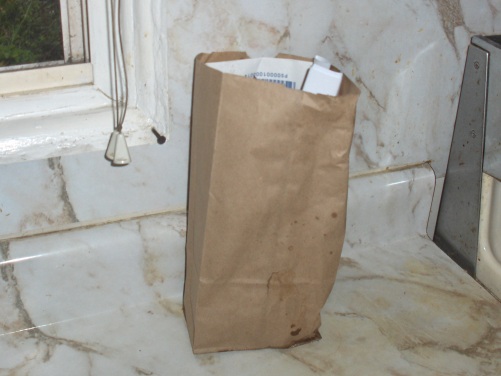
Now dogs & cats can help convert many meat type byproducts into fertilizer, but the diversity of what can be burned is far superior.
Much of the junk mail and the like are burned as well, but certainly not all. Glossy color inks, or anything laser printed, are the burning of plastic. But any typical white stock paper or newspaper stock by products are perfectly burnable.
To employ this method a simple paper lunch bag on the counter is usually good enough. As it fills take and throw into the firepit to remove from the interior environment. Other by products from daily life quickly convert to these purposes as they flow through. Anything non-gloss that soaks in oils & grease are ideal. Oil & grease have tons of energy and shouldn't be wasted on the trash service anyhow.
RECYCLE:
When most else fails its on to the recycle output. Ironically I don't even have proper recycle bins this year or last. They only provide 2 and both were 'stolen' the year before. I just use boxes etc. Any plastics, papers, glass or metals etc can go out. Last year I asked the pickup guy about how to properly separate. It turns out wads of paper (even wet) can be mixed together completely randomly with the rest. This means its all about breaking things down, and separating out the 'slimy' nasty stuff. Recently I started utilizing these see-through yard-pickup / contractor bags that have been in the garage for a couple years. As long as they can see in there and its all properly broke down there's a good change your will be picked up. It's all about common sense (i.e. plastic bolted to steel no good) and proper break down.

I prefer these jars as they're mostly spill proof, and I have the lids to store away my daily unfinished proprietary nootopic / anti-cancer formula tea in the fridge.

I save a lot of other jars and things for various purposes:

I especially fancy spice & medicine bottles as I grow and make my own spice blends & medicines, as well as conduct all sorts of chemistry each week:

Another by-product of living are these lids:

While they're on standby to cover a bucket with whatever, they rest where I keep my plates. They're lightweight and efficient to work with like paper (or worse foam) plates, but are reusable.
CATCH WATER:
I harness at least 10 gallons per day for my plants doing this:

Kitchen window (screen removed) is immediately behind the sink:



This ties more into the similar water savings method guide I will make eventually, but it demonstrates many of the other concepts herein. I use these one gallon ice cream bucket to catch water in the sink (amongst many other daily uses). It's also become my more common compost material disposal method. Pour this out the window into water catch vessel on wheels. This vessel rests in my 'semi-aquatic zone' where the constant splash out keeps the micro-climate moist and humid. When the bin gets yucky, or its about to rain, I haul the bin over to pour into ground planted areas.
General rules to catching sink water:
-NO oils or salty rinsing into the bin.
-Dairy rinse, like milk dishes, is good and helps balance the pH of the collective outflow.
-After the first rinse of soapy dishes the water should be perfectly good to catch.
Of course having a window immediately adjacent to the sink, with screen removed, should be pretty important to maintain such a routine. For a few years I've thought about gate valves with special sink drains for such a solution, but being a renter not a chance of such project. For a while I was using the buckets on the counter for compost, but then realized I can use the bucket to solve the sink water issue. Now a lot of compost material goes out in the bucket of water, or I simply chuck the stuff out there amongst all the potted plants in the yard.
BURN!:
Big city livin':

This step is crucial in minimizing trash out out to the fullest. Until I started burning regularly just recently, the concept of zero trash output had never even been a goal or item of much thought. Now that I burn, right in the heart of the city where its very uncommon, feeding the fuel flow is part of the goals. Now meats, oils & grease, breading etc are all burned. Generally they make the fire smell just for a spell. I had a can of olive oil go rancid on me last year so stuck under the sink. Recently I've been using it for starting fuel on occasion when improper kindling ratios are a problem. Soon the oil will be all poured out, and then I'll be able to put the can in the recycle bins.
Fuel brick:

Now dogs & cats can help convert many meat type byproducts into fertilizer, but the diversity of what can be burned is far superior.
Much of the junk mail and the like are burned as well, but certainly not all. Glossy color inks, or anything laser printed, are the burning of plastic. But any typical white stock paper or newspaper stock by products are perfectly burnable.
To employ this method a simple paper lunch bag on the counter is usually good enough. As it fills take and throw into the firepit to remove from the interior environment. Other by products from daily life quickly convert to these purposes as they flow through. Anything non-gloss that soaks in oils & grease are ideal. Oil & grease have tons of energy and shouldn't be wasted on the trash service anyhow.
RECYCLE:
When most else fails its on to the recycle output. Ironically I don't even have proper recycle bins this year or last. They only provide 2 and both were 'stolen' the year before. I just use boxes etc. Any plastics, papers, glass or metals etc can go out. Last year I asked the pickup guy about how to properly separate. It turns out wads of paper (even wet) can be mixed together completely randomly with the rest. This means its all about breaking things down, and separating out the 'slimy' nasty stuff. Recently I started utilizing these see-through yard-pickup / contractor bags that have been in the garage for a couple years. As long as they can see in there and its all properly broke down there's a good change your will be picked up. It's all about common sense (i.e. plastic bolted to steel no good) and proper break down.
edit on 21-4-2013 by IgnoranceIsntBlisss because: (no
reason given)
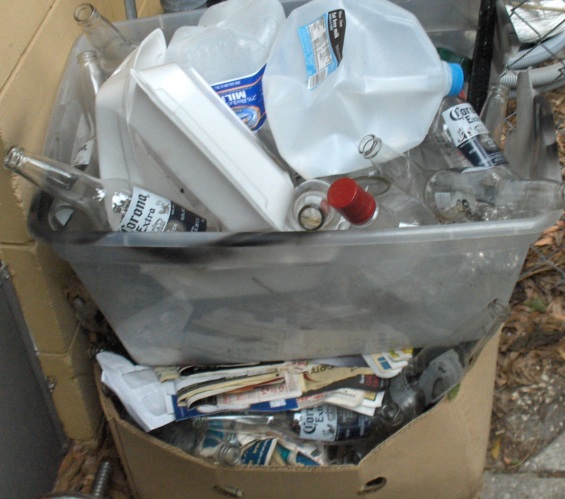
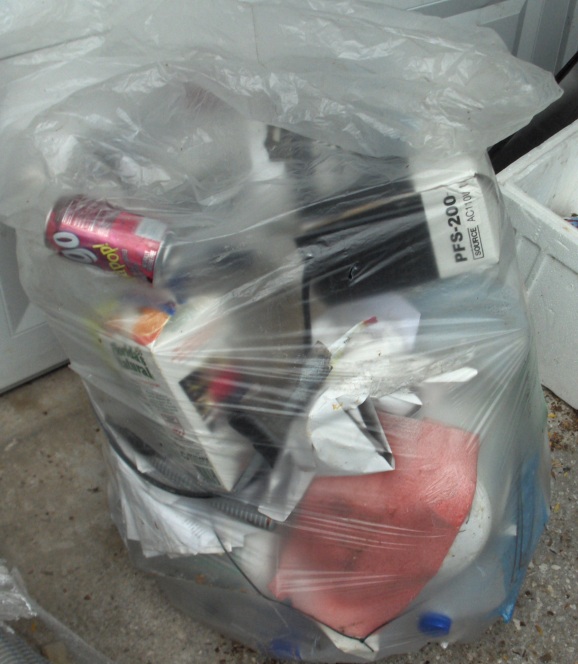
This might seem like a waste of time, but assuming your institution is properly run, their profits from the recycling arm of waste disposal should drive down the prices we get billed collectively for total services.
ALMOST FORGOT:
I scoop the ash from the fire pit into these 22 gallon rain bins down this side of my house:
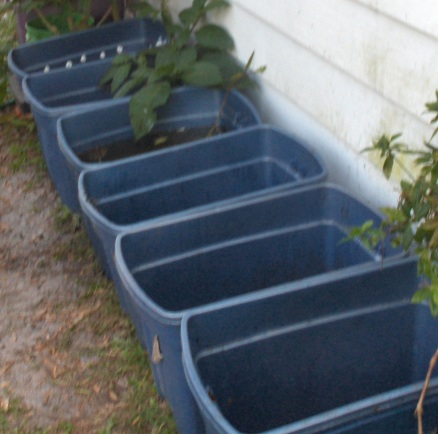
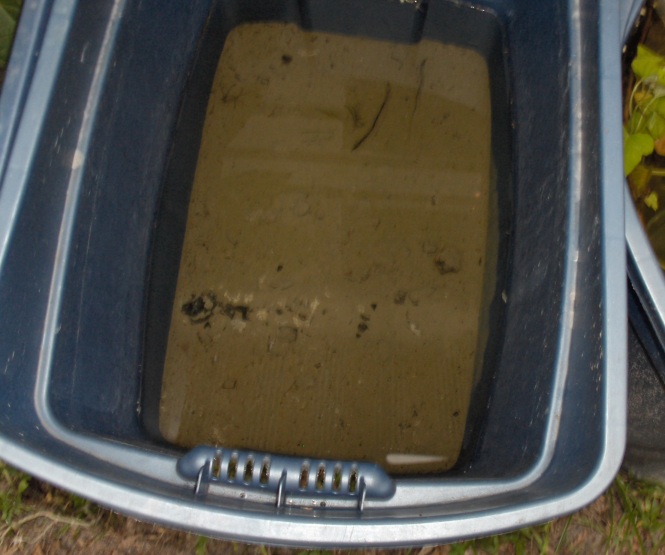
This makes for good fertilizer water. With square 4 or 5 gallon buckets I easily scoop the water from these bins and throw it across my rows of potted plants, and can deep water a row in a matter of seconds which would normally take sveral minutes with the hose. The square buckets outflow makes a nice flat water stream perfect for evenly watering 14" pots.
This year by phasing out all boxes and bins for storage, replacing with 100% rugged uniform milk crates, I was able to upgrade last years row of buckets to 25 big bins...
Old method:
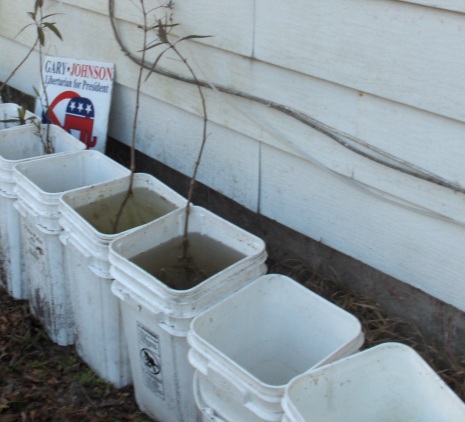
edit on 21-4-2013 by IgnoranceIsntBlisss because: (no reason given)
I love the positive and informative info you have shared here! While a few things (such as using grocery bags as garbage bags) seem (to me at least
kinda 'no-brainers' - it is amazing to see how many others do not think in likewise ways. Seems that everything nowadays is 'disposable' and with
that comes the future implications of our past and current habits- just where do people think all the garbage they produce goes?!
You've listed some great tips here, some more practical and beneficial than others... The planter you made out of repurposed wood is a great example of a simple change everday people can easily make. Not only does it save money, it reduces waste and also creates an activity with lasting results.
I admire your diligence and depth of waste reduction, and hey, more money saved is more money for those Coronas =) but I'm really curious bout one thing- when you use the box as the trash receptacle- what do u do with those bottles when they're empty?
You've listed some great tips here, some more practical and beneficial than others... The planter you made out of repurposed wood is a great example of a simple change everday people can easily make. Not only does it save money, it reduces waste and also creates an activity with lasting results.
I admire your diligence and depth of waste reduction, and hey, more money saved is more money for those Coronas =) but I'm really curious bout one thing- when you use the box as the trash receptacle- what do u do with those bottles when they're empty?
reply to post by crystalLibra
Appreciate the applause. The bottles I pour out (and sometimes rinse) and send out in whatever this weeks device for all the other recycle bound materials are jettisoned in.
Appreciate the applause. The bottles I pour out (and sometimes rinse) and send out in whatever this weeks device for all the other recycle bound materials are jettisoned in.
Interesting thread. What's the point of the burning? You are reducing pollution in some ways and adding to it in others.
Originally posted by SteveR
Interesting thread. What's the point of the burning? You are reducing pollution in some ways and adding to it in others.
Compared to what else? Burying/dumping the trash out of sight and out of mind? There is some trash, especially plastics, that have no good answer on how to dispose of them properly. Same with the new various kinds of fluorescent lightbulbs and other tech trash.
One idea is to put the trash burden on the company that produced/sold the trash. They may start finding more Earth friendly packaging methods when recycling their old trash becomes too costly.
To the OP, this is a great post! This is basically how I live in the middle of nowhere here. Recycling plays a key part in life, or else you are left with piles of trash to deal with. There is no trash service / recycling facility here, so you are literally responsible for your own mess. A responsibility lost in most "civilized" places.
One thing you may want to consider is setting up your drains to go to a gray water tank. I see you collecting drip water, but where does all the water go that you use for washing dishes or taking a bath?
The pictures are great too! Thanks for sharing =)
(PS. Look up "bottle bricks" for more ideas on recycling trash)
This is fantastic - I've been trying to work toward the same goal and have a long way to go. Some of these are tips I hadn't heard before but will
definitely be adopting.
Originally posted by Philippines
Compared to what else? Burying/dumping the trash out of sight and out of mind?
Originally posted by SteveR
Interesting thread. What's the point of the burning? You are reducing pollution in some ways and adding to it in others.
Is the smoke out of sight out of mind? Biodegradable materials and organics don't need to be disposed of by burning.
Plastics should always be recycled, burning them is even worse than burying.
edit on 2013/4/22 by SteveR because: spelling
reply to post by SteveR
Whats the real difference? What does that smoke really change?
First, are you forever avowed to never again enjoy the simple pleasure of a bonfire?
Luckily my potential quality of life isn't perpetually detrimented by emotional notions of theories of AGW, and the details of it potential discontents, but if it were I look at it like this: Burying in landfill will have such waste slowly degrade into methane (into the atmosphere). Burning acutely in fire has it turn mostly into CO2, fast. Which is worse? Does it REALLY make a difference? In any case, is more rapidly tranducing a solid into a gas, does that make us polluters? Me on occasion burning non glossy stock paper and meat byproducts along with logs picked all up from around the neighborhood (dumped in polluting type regard) a few nights over the fire that is my peace for my hard earned efforts, if we cant expect to be able to enjoy such without having to think twice, then what is it even worth fighting for? In such case its already too late, all is already lost, and in that case smoke em if you got em.
Whats the real difference? What does that smoke really change?
First, are you forever avowed to never again enjoy the simple pleasure of a bonfire?
Luckily my potential quality of life isn't perpetually detrimented by emotional notions of theories of AGW, and the details of it potential discontents, but if it were I look at it like this: Burying in landfill will have such waste slowly degrade into methane (into the atmosphere). Burning acutely in fire has it turn mostly into CO2, fast. Which is worse? Does it REALLY make a difference? In any case, is more rapidly tranducing a solid into a gas, does that make us polluters? Me on occasion burning non glossy stock paper and meat byproducts along with logs picked all up from around the neighborhood (dumped in polluting type regard) a few nights over the fire that is my peace for my hard earned efforts, if we cant expect to be able to enjoy such without having to think twice, then what is it even worth fighting for? In such case its already too late, all is already lost, and in that case smoke em if you got em.
edit on 22-4-2013 by IgnoranceIsntBlisss because: (no reason given)
I once watched a documentary that claimed for every 1 bag of trash from a house there is 80 being made by industry. Not only that but they are less
likely to recycle. So even if everyone in the world had a house like this its wouldn't even make the smallest dent on the real problem.
reply to post by IgnoranceIsntBlisss
Good job!
I guess burning old papers and cardboard is ok,but I wouldn't burn plastics.
If you are tech minded,there is a way to extract oil from plastics-not sure how easy it is though.
A good system you have though-almost looks like less work than sorting out all your seperate recycling bins for collection.
Good job!
I guess burning old papers and cardboard is ok,but I wouldn't burn plastics.
If you are tech minded,there is a way to extract oil from plastics-not sure how easy it is though.
A good system you have though-almost looks like less work than sorting out all your seperate recycling bins for collection.
Originally posted by PhoenixOD
I once watched a documentary that claimed for every 1 bag of trash from a house there is 80 being made by industry. Not only that but they are less likely to recycle. So even if everyone in the world had a house like this its wouldn't even make the smallest dent on the real problem.
That is where you stop buying certain products that do produce this, and start buying products from companies that have a ZERO Landfill policy like HONDA!
www.greenmanufacturer.net...
I do almost the exact same thing.
I compost all vegetable waste;
I feed all animal waste (meat, bones) to my cat and dog;
I burn all paper and light plastics
I recycle what ever else can be recyled
As a result, a family of three produces next to no trash.
I compost all vegetable waste;
I feed all animal waste (meat, bones) to my cat and dog;
I burn all paper and light plastics
I recycle what ever else can be recyled
As a result, a family of three produces next to no trash.
Originally posted by SteveR
Interesting thread. What's the point of the burning? You are reducing pollution in some ways and adding to it in others.
You know, once a product is produced - be it paper, plastic - it will eventually become pollution in some form. For most of this stuff, it will either pollute the ground (soil, water, etc.) or the air. I don't see where burning it is ultimately any different from throwing it in a land fill. Either way, it will get back into the ecosystem.
Originally posted by abeverage
Originally posted by PhoenixOD
I once watched a documentary that claimed for every 1 bag of trash from a house there is 80 being made by industry. Not only that but they are less likely to recycle. So even if everyone in the world had a house like this its wouldn't even make the smallest dent on the real problem.
That is where you stop buying certain products that do produce this, and start buying products from companies that have a ZERO Landfill policy like HONDA!
www.greenmanufacturer.net...
Ok Honda gets a thumbs up from me
But that does make me wonder is Honda buying all their materials off companies that have the same policy? Because they dont make a lot from scratch, they just put stuff together.
edit on 22-4-2013 by PhoenixOD because: (no reason given)
I'm happy to see you recycling and reusing things. S&F for being conservative. People don't understand how much they can save by doing this
kind of thing. If you are aware of your waste, you tend not to waste so much. You feel guilty wasting something when you have to handle it more than
once. It is cheaper to watch how much perishable stuff you buy.
Most of the paper you burn could be added to a composte bin. That way it is being reused, and not poluting with the smoke.
other than that, I think you are doing very well.
other than that, I think you are doing very well.
edit on 22-4-2013 by RobertF because: to add
Originally posted by PhoenixOD
Originally posted by abeverage
Originally posted by PhoenixOD
I once watched a documentary that claimed for every 1 bag of trash from a house there is 80 being made by industry. Not only that but they are less likely to recycle. So even if everyone in the world had a house like this its wouldn't even make the smallest dent on the real problem.
That is where you stop buying certain products that do produce this, and start buying products from companies that have a ZERO Landfill policy like HONDA!
www.greenmanufacturer.net...
Ok Honda gets a thumbs up from me
But that does make me wonder is Honda buying all their materials off companies that have the same policy? Because they dont make a lot from scratch, they just put stuff together.
edit on 22-4-2013 by PhoenixOD because: (no reason given)
It doesn't but it is a start! I support good policies and this will encourage other companies to do the same! There is no reason everything we buy cannot be 100% recyclable!
a) DIY burning of trash is very likely to be dirtier to the environment that industrial strength incinerators many communities use. You may feel good
about yourself when you burn trash, but in fact you are polluting the atmosphere. Why bother...
b) For drinking glasses, look no further than those which they use to package "Mole" and other Mexican condiments in supermarkets, they often come in real glasses topped with a removable cap, we've been using these for years and they are often very nice looking.
b) For drinking glasses, look no further than those which they use to package "Mole" and other Mexican condiments in supermarkets, they often come in real glasses topped with a removable cap, we've been using these for years and they are often very nice looking.
new topics
-
Electrical tricks for saving money
Education and Media: 3 minutes ago -
VP's Secret Service agent brawls with other agents at Andrews
Mainstream News: 1 hours ago -
Sunak spinning the sickness figures
Other Current Events: 2 hours ago -
Nearly 70% Of Americans Want Talks To End War In Ukraine
Political Issues: 2 hours ago -
Late Night with the Devil - a really good unusual modern horror film.
Movies: 4 hours ago -
Cats Used as Live Bait to Train Ferocious Pitbulls in Illegal NYC Dogfighting
Social Issues and Civil Unrest: 5 hours ago -
The Good News According to Jesus - Episode 1
Religion, Faith, And Theology: 7 hours ago -
HORRIBLE !! Russian Soldier Drinking Own Urine To Survive In Battle
World War Three: 9 hours ago
top topics
-
SETI chief says US has no evidence for alien technology. 'And we never have'
Aliens and UFOs: 16 hours ago, 8 flags -
Florida man's trip overseas ends in shock over $143,000 T-Mobile phone bill
Social Issues and Civil Unrest: 12 hours ago, 8 flags -
Cats Used as Live Bait to Train Ferocious Pitbulls in Illegal NYC Dogfighting
Social Issues and Civil Unrest: 5 hours ago, 7 flags -
VP's Secret Service agent brawls with other agents at Andrews
Mainstream News: 1 hours ago, 6 flags -
Former Labour minister Frank Field dies aged 81
People: 14 hours ago, 4 flags -
Bobiverse
Fantasy & Science Fiction: 12 hours ago, 3 flags -
HORRIBLE !! Russian Soldier Drinking Own Urine To Survive In Battle
World War Three: 9 hours ago, 3 flags -
Nearly 70% Of Americans Want Talks To End War In Ukraine
Political Issues: 2 hours ago, 3 flags -
Sunak spinning the sickness figures
Other Current Events: 2 hours ago, 3 flags -
Late Night with the Devil - a really good unusual modern horror film.
Movies: 4 hours ago, 2 flags
active topics
-
Electrical tricks for saving money
Education and Media • 0 • : annonentity -
Late Night with the Devil - a really good unusual modern horror film.
Movies • 4 • : DBCowboy -
Hate makes for strange bedfellows
US Political Madness • 41 • : Solvedit -
Nearly 70% Of Americans Want Talks To End War In Ukraine
Political Issues • 11 • : DBCowboy -
SETI chief says US has no evidence for alien technology. 'And we never have'
Aliens and UFOs • 40 • : Irishhaf -
President BIDEN Vows to Make Americans Pay More Federal Taxes in 2025 - Political Suicide.
2024 Elections • 124 • : Justoneman -
Ditching physical money
History • 20 • : GENERAL EYES -
Sunak spinning the sickness figures
Other Current Events • 3 • : NoCorruptionAllowed -
VP's Secret Service agent brawls with other agents at Andrews
Mainstream News • 13 • : DAVID64 -
The Reality of the Laser
Military Projects • 42 • : Zaphod58
